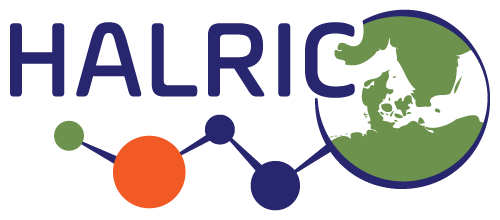Hanseatic Life Science Research Infrastructure Consortium

During the past decade, significant development and investments have been made in advanced research infrastructures in the Öresund Kattegat Skagerrak (ÖKS)-Hamburg area. The facilities already provide advanced Life Science tools, but there is an untapped potential to further expand the collaboration at and around the sites, as well as cross-borders.
HALRIC aims to be a springboard for innovation capacity in the ÖKS-Hamburg Life Science sector via increased access to and use of cross-border front-end technologies, instruments, expertise, and data handling solutions.
HALRIC is an EU-supported project working to bring more companies, hospitals and academic researchers together in collaborations with:
- The large-scale infrastructures, such as MAX IV & DESY and ESS & European XFEL
- And with cutting-edge complementary infrastructures such as cryoEM, advanced biological MS, and 7Tesla-MR.
HALRIC is a consortium strengthening life science research and innovation network in southern Scandinavia and northern Germany. In addition to the University of Hamburg, the German project partners include the Ministry of Science (BWFGB) of the Free and Hanseatic City of Hamburg, the University Medical Center Hamburg-Eppendorf, DESY, European XFEL, the European Molecular Biology Laboratory EMBL and the Life Science Nord Cluster. Other partners in Sweden include the University of Lund and the University of Malmö, in Denmark the University of Copenhagen, the Technical University of Denmark, the University of Aarhus, the University of Southern Denmark and in Norway the University of Oslo.
With the infrastructures comes advanced know-how and technology for sample production and preparation. The research facilities can also be used in pre-clinical and clinical research areas, which brings the innovation potential close to the patient in the shape of potential new treatments.
Through pilot projects HALRIC will facilitate collaboration between academia, hospitals, SMEs as well as larger biotech and pharma companies. The partnership welcomes research project proposals for the use of one or more research infrastructures in the HALRIC consortium.
HALRIC will also work on prototype models for handling the huge amounts of electronic data generated by such infrastructures, as well as on strengthening the Life Science ecosystems and strategic dialogues between the four countries in the project.
Lund University is lead partner for the HALRIC consortium, which includes 20 other partner organizations across Sweden, Denmark, Germany and Norway. The consortium constitutes the full spectrum of organizations needed for multidisciplinary collaboration with the Life Science industry.
HALRIC is a 3-year project funded by the EU-program Interreg Öresund-Kattegat-Skagerrak, which supports joint projects in the southwest of Scandinavia that promote development of societal innovation, green economy, transportation and employment.
For further information, visit halric.eu and follow the project on LinkedIn and X/Twitter.

